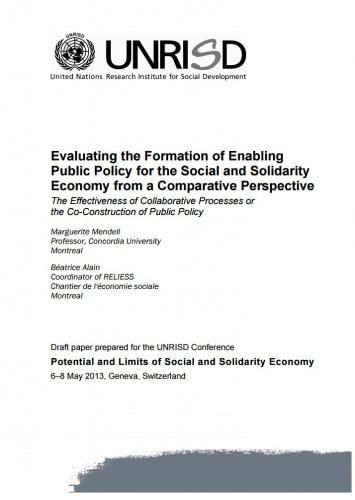The Effectiveness of Collaborative Processes or the Co-Construction of Public Policy
The stated goal of the UNRISD conference held May 6-8, 2013, in Geneva, Switzerland was “to explore the potential and limits of the social and solidarity economy (SSE) — organizations such as cooperatives, women’s self-help groups, social enterprise and associations of informal workers that have explicit social and economic objectives, and involve various forms of cooperation and solidarity”. The objective of this international conference was to “raise the visibility of debates about the SSE within the United Nations system and beyond, and contribute to thinking in international policy circles about a post-2015 development agenda”. This is a critical objective at a time when the SSE is demonstrating its transformative capacity but is often constrained by the absence of an enabling policy environment.
As shown in this paper, existing policy measures embedded within long-established policy settings are increasingly meeting roadblocks, even where there is willingness to introduce policies to promote the development of the SSE.
Download Evaluating the Formation of Enabling Public Policy for the Social and Solidarity Economy from a Comparative Perspective
Based on the case studies carried out for FIESS, the OECD and RELIESS, this paper examines the advantages of co-construction and the conditions for effective collaborative processes to formulate and implement public policy for the SSE. The diversity of the countries represented by these case studies, provides examples of how new processes of policy design are emerging under very different conditions, including in countries where this would seemingly be more difficult to introduce. The case studies demonstrate that collaborative approaches to policy formation in which government becomes a strategic enabler, facilitates the development and growth of the SSE, and leads to greater policy effectiveness. However, not all processes of policy formation documented in the case studies are collaborative. We will also point out the shortcomings of narrow policy measures as well as traditional modes of policy formation in achieving the broad goals of the SSE
Table of Contents
Introduction
1. Why co-construction
1.1 Co-construction allows the SSE to realize its potential
1.2 Co-construction reduces information asymmetry and transaction costs
1.3 Co-construction ensures policy effectiveness
2. Requirements for effective co-construction
2.1 Representative networks and intermediary bodies
2.1.1 Broad representation
2.1.2 Networks
2.1.3 Towards optimal integration
2.2 Government commitment and capacity
2.3 Inter-governmental collaboration
2.4 Long term support to the SSE
CONCLUSION
BIBLIOGRAPHY
ANNEX





